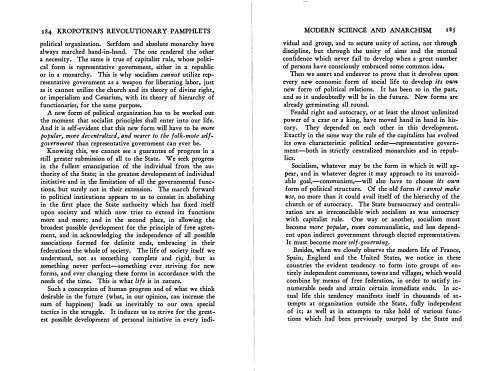Kropotkin's Revolutionary Pamphlets - Libcom
Kropotkin's Revolutionary Pamphlets - Libcom
Kropotkin's Revolutionary Pamphlets - Libcom
You also want an ePaper? Increase the reach of your titles
YUMPU automatically turns print PDFs into web optimized ePapers that Google loves.
18.., KROPOTKIN'S REVOLUTIONARY PAMPHLETS<br />
political organization.<br />
Serfdom and absolute monarchy have<br />
always marched hand-in-hand. The one rendered the other<br />
a necessity. The same is true of capitalist rule, whose political<br />
form is representative government, either in a republic<br />
or in a monarchy. This is why socialism cannot utilize representative<br />
government as a weapon for liberating labor, just<br />
as it cannot utilize the church and its theory of divine right.<br />
or imperialism and Cresarism. with its theory of hierarchy of<br />
functionaries, for the same purpose.<br />
A new form of political organization has to be worked out<br />
the moment that socialist principles shall enter into our life.<br />
And it is self-evident that this new form will have to be mere<br />
popular, more decentralized, and nearer to the folk-mote set/<br />
government than representative government can ever be.<br />
Knowing this, we cannot see a guarantee of progress in a<br />
still greater submission of all to the State. We seek progress<br />
in the fullest emancipation of the individual from the authority<br />
of the State; in the greatest development of individual<br />
initiative and in the limitation of all the governmental functions,<br />
but surely not in their extension. The march forward<br />
in political institutions appears to us to consist in abolishing<br />
in the first place the State authority which has fixed itself<br />
upon society and which now tries to extend its functions<br />
more and more ; and in the second place, in allowing the<br />
broadest possible development for the principle of free agreement,<br />
and in acknowledging the independence of all possible<br />
associations formed for definite ends, embracing in their<br />
federations the whole of society. The life of society itself we<br />
understand, not as something complete and rigid, but as<br />
something never perfect--something ever striving for new<br />
forms, and ever changing these forms in accordance with the<br />
needs of the time.<br />
This is what life is in nature.<br />
Such a conception of human progress and of what we think<br />
desirable in the future (what, in our opinion, can increase the<br />
sum of happiness) leads us inevitably to our own special<br />
tactics in the struggle. It induces us to strive for the greatest<br />
possible development of personal initiative in every indi-<br />
MODERN SCIENCE AND ANARCHISM<br />
vidual and group, and to secure unity of action, not through<br />
discipline. but through the unity of aims and the mutual<br />
confidence which never fail to develop when a great number<br />
of persons have consciously embraced some common idea.<br />
Then we assert and endeavor to prove that it devolves upon<br />
every new economic form of social life to develop its own<br />
new form of political relations. It has been so in the past,<br />
and so it undoubtedly will be in the future. New forms are<br />
already germinating all round.<br />
Feudal right and autocracy, or at least the almost unlimited<br />
power of a czar or a king, have moved hand in hand in his·<br />
tory. They depended on each other in this development.<br />
Exactly in the same way the rule of the capitalists has evolved<br />
its own characteristic political order-representative government-both<br />
in strictly centralized monarchies and in repub.<br />
lics.<br />
Socialism. whatever may be the form in which it will appear,<br />
and in whatever degree it may approach to its unavoidable<br />
goal,-communism.-will also have to choose its Q'Uln<br />
form of political structure. Of the old form it cannot make<br />
use no more than it could avail itself of the hierarchy of the<br />
chch or of autocracy. The State bureaucracy and centralization<br />
are as irreconcilable with socialism as was autocracy<br />
with capitalist rule. One way or another, socialism must<br />
become more popular, more communalistic, and less dependent<br />
upon indirect government through elected representatives.<br />
It must become more self-gaverning.<br />
Besides, when we closely observe the modern life of France,<br />
Spain, England and the United States, we notice in these<br />
countries the evident tendency to form into groups of entirely<br />
independent communes, towns and villages, which would<br />
combine by means of free federation, in order to satisfy innumerable<br />
needs and attain certain immediate ends. In actual<br />
life this tendency manifests itself in thousands of attempts<br />
at organization outside the State, fully independent<br />
of it; as well as in attempts to take hold of various functions<br />
which had been previously usurped by the State and

















